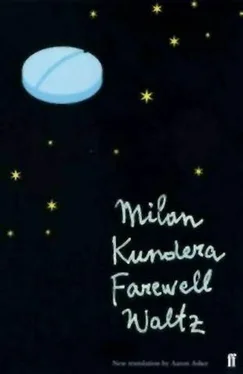"That's something I was unaware of," said Jakub, and Bertlef went over to the liquor cabinet. He conferred with his two visitors for a few moments about what to drink. When he had poured cognac into the three glasses, he turned to the physician: "Please don't forget about that unhappy expectant father. It is very important to me!"
Skreta assured Bertlef that it would all end well, and Jakub then asked what they were talking about. After they told him (let us appreciate the graceful discretion of the two men, who, even though it was only Jakub with them, mentioned no names), he expressed great pity for the unfortunate begetter: "Which of us hasn't lived through this martyrdom! It's one of life's great trials. Those who give in and become fathers against their will are doomed forever by their defeat. They become spiteful, like all losers, and they wish the same fate on everyone else."
"My friend!" Bertlef exclaimed. "You are speaking
in the company of a happy father! If you stayed here for another day or two, you would see my son, a beautiful child, and you would take back what you have just said!"
"I wouldn't take anything back," said Jakub, "because you didn't become a father against your will!"
"Certainly not. I became a father by my own free will and by the good will of Doctor Skreta."
The doctor nodded with an air of satisfaction and declared that he too had a notion of fatherhood different from Jakub's, as shown, by the way, by the blessed state of his dear Suzy. "The only thing," he added, "that puzzles me a bit about procreation is how senselessly parents choose each other. It's incredible what hideous-looking individuals decide to procreate. They probably imagine that the burden of ugliness will be lighter if they share it with their descendants."
Bertlef called Dr. Skreta's viewpoint aesthetic racism: "Don't forget that not only was Socrates ugly but also that many famous women lovers did not distinguish themselves at all by their physical perfection. Aesthetic racism is almost always a sign of inexperience. Those who have not made their way far enough into the world of amorous delights judge women only by what can be seen. But those who really know women understand that the eye reveals only a minute fraction of what a woman can offer us. When God bade mankind be fruitful and multiply, Doctor, He was thinking of the ugly as well as of the beautiful. I am
convinced, I might add, that the aesthetic criterion does not come from God but from the devil. In paradise no distinction was made between ugliness and beauty."
Jakub reentered the conversation, asserting that aesthetic considerations played no part in the loathing he felt for procreation. "But I can cite ten other reasons for not being a father."
"What are they? I am curious."
"First of all, I don't like motherhood," said Jakub, and he broke off pensively. "Our century has already unmasked all myths. Childhood has long ceased to be an age of innocence. Freud discovered infant sexuality and told us all about Oedipus. Only Jocasta remains untouchable; no one dares tear off her veil. Motherhood is the last and greatest taboo, the one that harbors the most grievous curse. There is no stronger bond than the one that shackles mother to child. This bond cripples the child's soul forever and prepares for the mother, when her son has grown up, the most cruel of all the griefs of love. I say that motherhood is a curse, and I refuse to contribute to it."
"Next!" said Bertlef.
"Another reason I don't want to add to the number of mothers," said Jakub with some embarrassment, "is that I love the female body, and I am disgusted by the thought of my beloved's breast becoming a milk-bag."
"Next! "said Bertlef.
"The doctor here will certainly confirm that physicians and nurses treat women hospitalized after an aborted pregnancy more harshly than those who have
given birth, and show some contempt toward them even though they themselves will, at least once in their lives, need a similar operation. But for them it's a reflex stronger than any kind of thought, because the cult of procreation is an imperative of nature. That's why it's useless to look for the slightest rational argument in natalist propaganda. Do you perhaps think it's the voice of Jesus you're hearing in the natalist morality of the church? Do you think it's the voice of Marx you're hearing in the natalist propaganda of the Communist state? Impelled merely by the desire to perpetuate the species, mankind will end up smothering itself on its small planet. But the natalist propaganda mill grinds on, and the public is moved to tears by pictures of nursing mothers and infants making faces. It disgusts me. It chills me to think that, along with millions of other enthusiasts, I could be bending over a cradle with a silly smile."
"Next!" said Bertlef.
"And of course I also have to ask myself what sort of world I'd be sending my child into. School soon takes him away to stuff his head with the falsehoods I've fought in vain against all my life. Should I see my son become a conformist fool? Or should I instill my own ideas into him and see him suffer because he'll be dragged into the same conflicts I was?"
"Next!" said Bertlef.
"And of course I also have to think of myself. In this country children pay for their parents' disobedience, and parents for their children's disobedience. How
many young people have been denied education because their parents fell into disgrace? And how many parents have chosen permanent cowardice for the sole purpose of preventing harm to their children? Anyone who wants to preserve at least some freedom here shouldn't have children," Jakub said, and fell into silence.
"You still need five more reasons to complete your decalogue," said Bertlef.
"The last reason carries so much weight that it counts for five," said Jakub. "Having a child is to show an absolute accord with mankind. If I have a child, it's as though I'm saying: I was born and have tasted life and declare it so good that it merits being duplicated."
"And you have not found life to be good?" asked Bertlef.
Jakub tried to be precise, and said cautiously: "All I know is that I could never say with complete conviction: Man is a wonderful being and I want to reproduce him."
"That's because you've only known life in its worst aspect," said Dr. Skreta. "You've never known how to live. You've always thought that it was your duty to be, as they say, in the thick of things. In the core of reality. But what was that reality for you? Politics. And politics is what is least essential and least precious in life. Politics is the dirty foam on the surface of the river, while the life of the river is lived much deeper. The study of female fertility has been going on for thousands of years. It's had a solid, steady history. And it's
quite indifferent to which government it is that happens to be in power. When I put on a rubber glove and examine a female organ, I'm much nearer the core of life than you, who nearly lost your life because you were concerned about the good of humanity."
Instead of protesting Jakub agreed with his friends reproaches, and Dr. Skreta, feeling encouraged, went on: "Archimedes with his circles, Michelangelo with his block of stone, Pasteur with his test tubes-they and they alone have transformed human life and made real history, while the politicians…" Skreta paused and waved his hand scornfully.
"While the politicians?" asked Jakub, and went on: "I'll tell you. If science and art are in fact the proper, real arenas of history, politics on the contrary is the closed scientific laboratory where unprecedented experiments are conducted on mankind. There human guinea pigs are hurled through trap doors and then brought back onto the stage, tempted by applause and terrified by the gallows, denounced and forced to denounce. I worked in that lab as an assistant, but I also served there several times as a victim of vivisection. I know that I created nothing of value there (no more than those who worked with me did), but I probably came to understand better than others what man is."
Читать дальше










